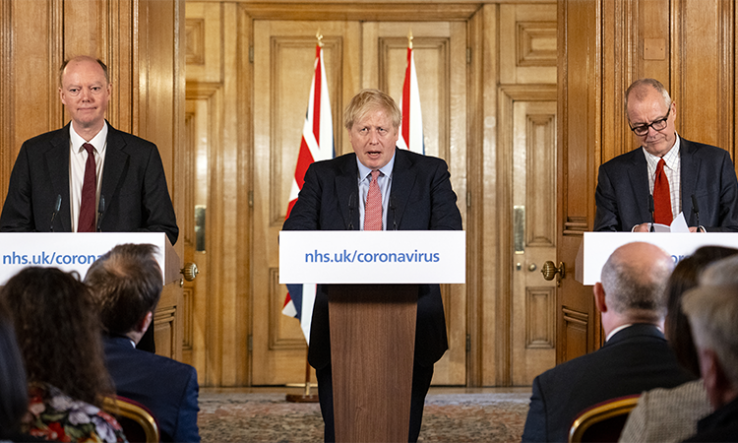
Image: Number 10 [CC BY-NC-ND 2.0], via Flickr
Chief scientist and chief medic put faith in researchers to eventually solve the pandemic
The two men at the heart of giving scientific and medical advice to the government have said ongoing work by researchers will be key to dealing with the Covid-19 pandemic, as they welcomed intense scrutiny of their policy work from colleagues.
Government chief scientist Patrick Vallance and chief medical officer Chris Whitty said that in the short term they want to delay the peak of the epidemic. In the medium-term, they expect a vaccine to be developed.
But the long-term strategy for exiting the pandemic relies on researchers’ ability come up with solutions, they told journalists at a Science Media Centre briefing in London on 19 March.
Vallance said it would be “a big scientific challenge to get in top of this” but that the “UK is absolutely world class in this type of science”.
The two men underscored the ‘work in progress’ nature of scientific understanding of what is going on.
“Science knowledge has evolved through this, we would answer the same question differently now than six weeks ago,” said Whitty.
He added that science “will help us over time to get to an optimal position” but this would need vaccines to prevent infections and drugs to treat them, neither of which are yet widely available or proven to be effective.
The advisers and the government have faced criticism from many other experts on their course of action and reasons for it, ranging from the government not moving fast enough to the reasons behind decisions being opaque. Both Whitty and Vallance welcomed this, though.
“[We] find critique very useful… it’s a helpful thing… provided it’s not ranting,” said Whitty.
Vallance added: “We are dealing with learning as we go along.” He underscored that they are not dealing with “absolute science” but rather “modelling…with wide confidence intervals”.
The government response is being informed by the Scientific Advisory Group for Emergencies, which currently has hundreds of scientists feeding into its discussions. Different experts join its meetings as needed, with around 20 people at the table on any given day.
Whitty said they are now confident about mortality rates and the epidemiological path the virus has taken, which is like reading “epidemiology textbook chapter one”.
Vallance reminded everyone about the bigger picture to keep in mind: “All deaths are tragedies to their families and you want to minimise that.”